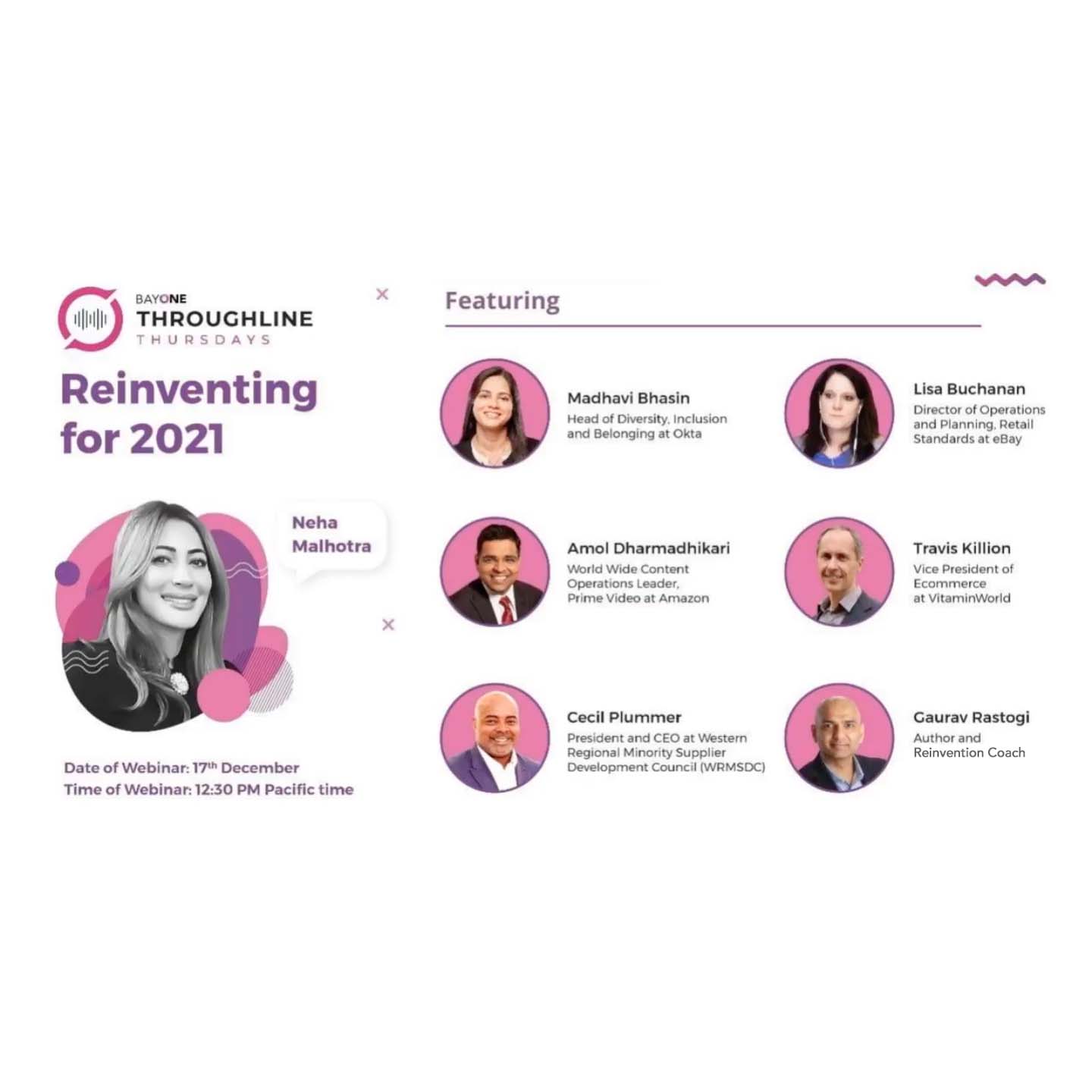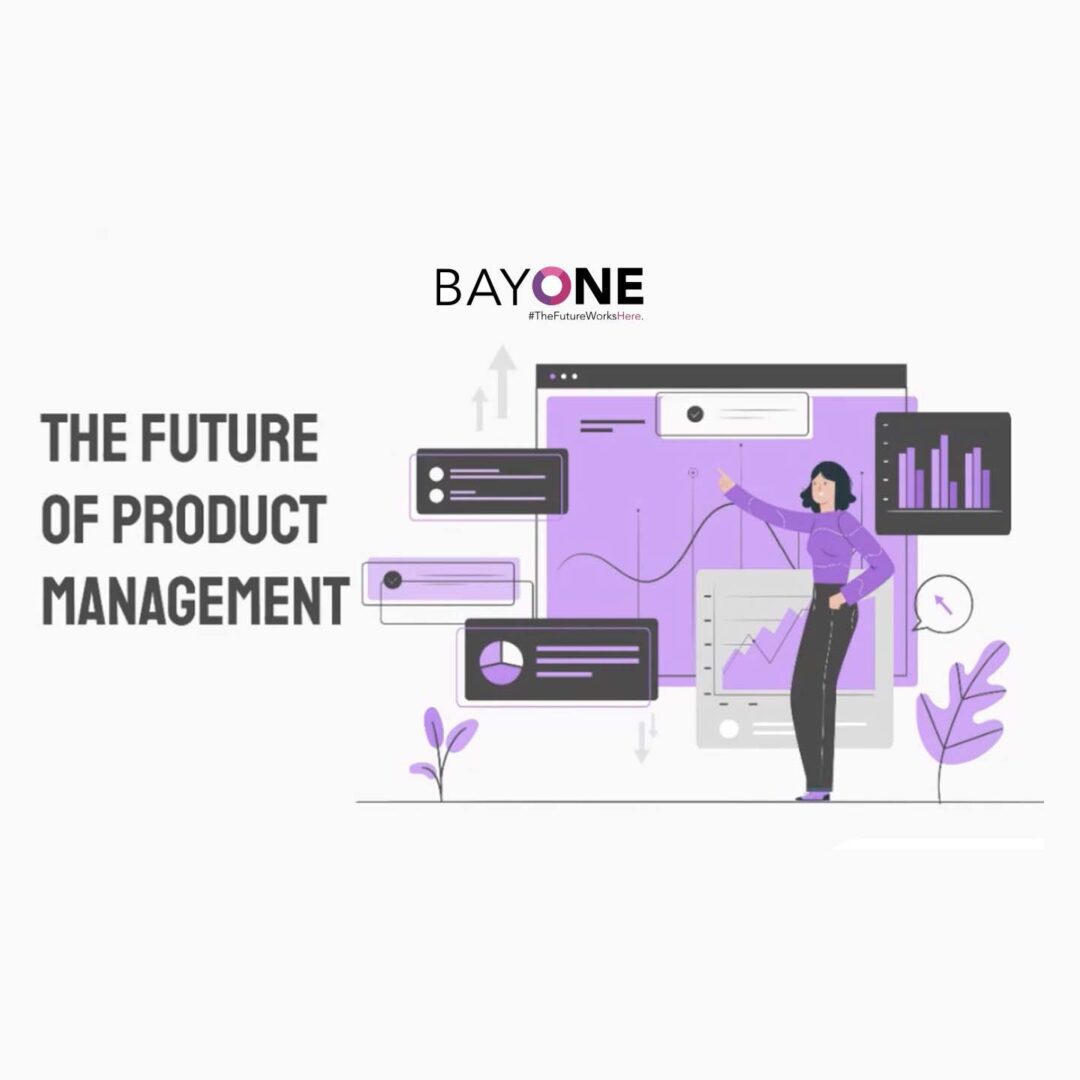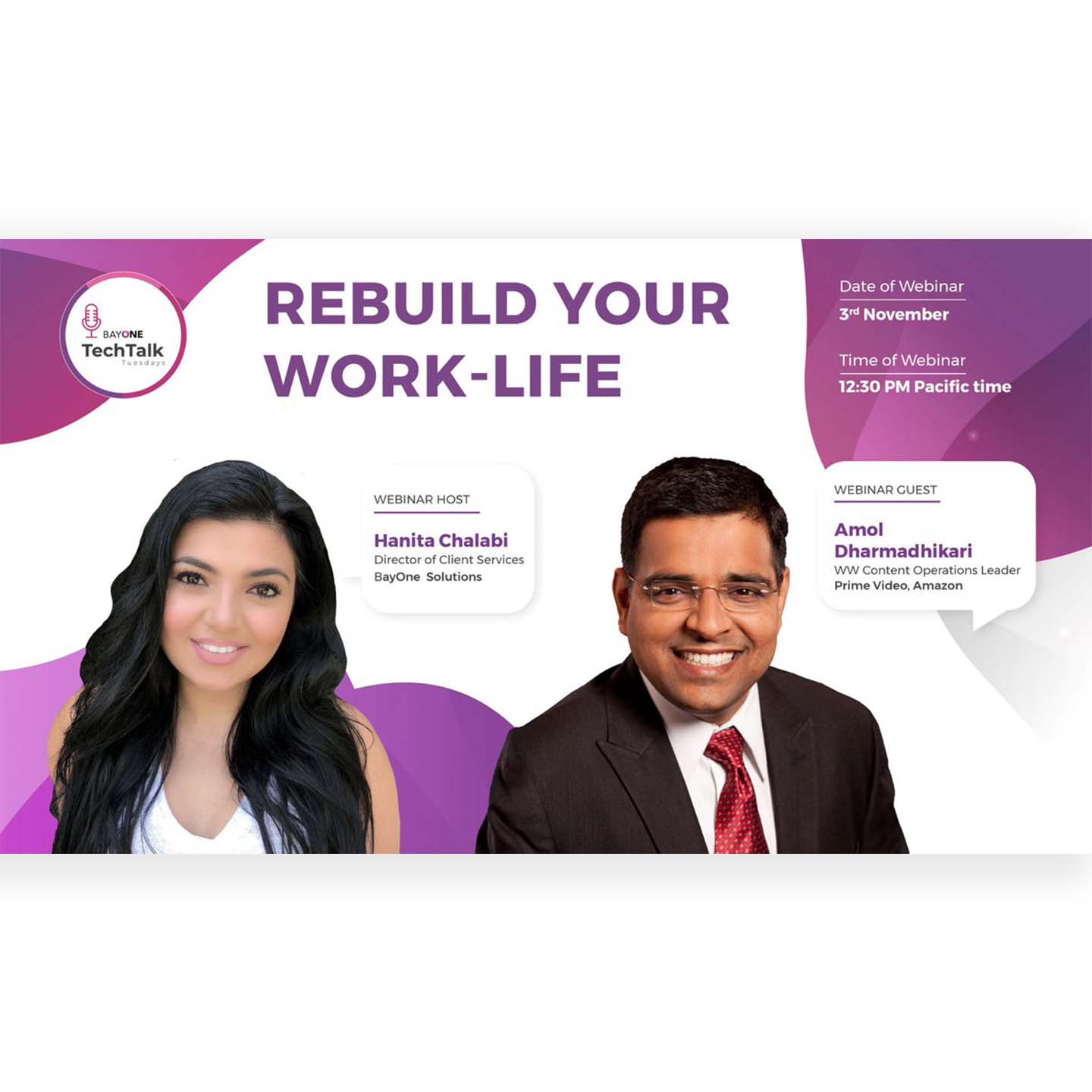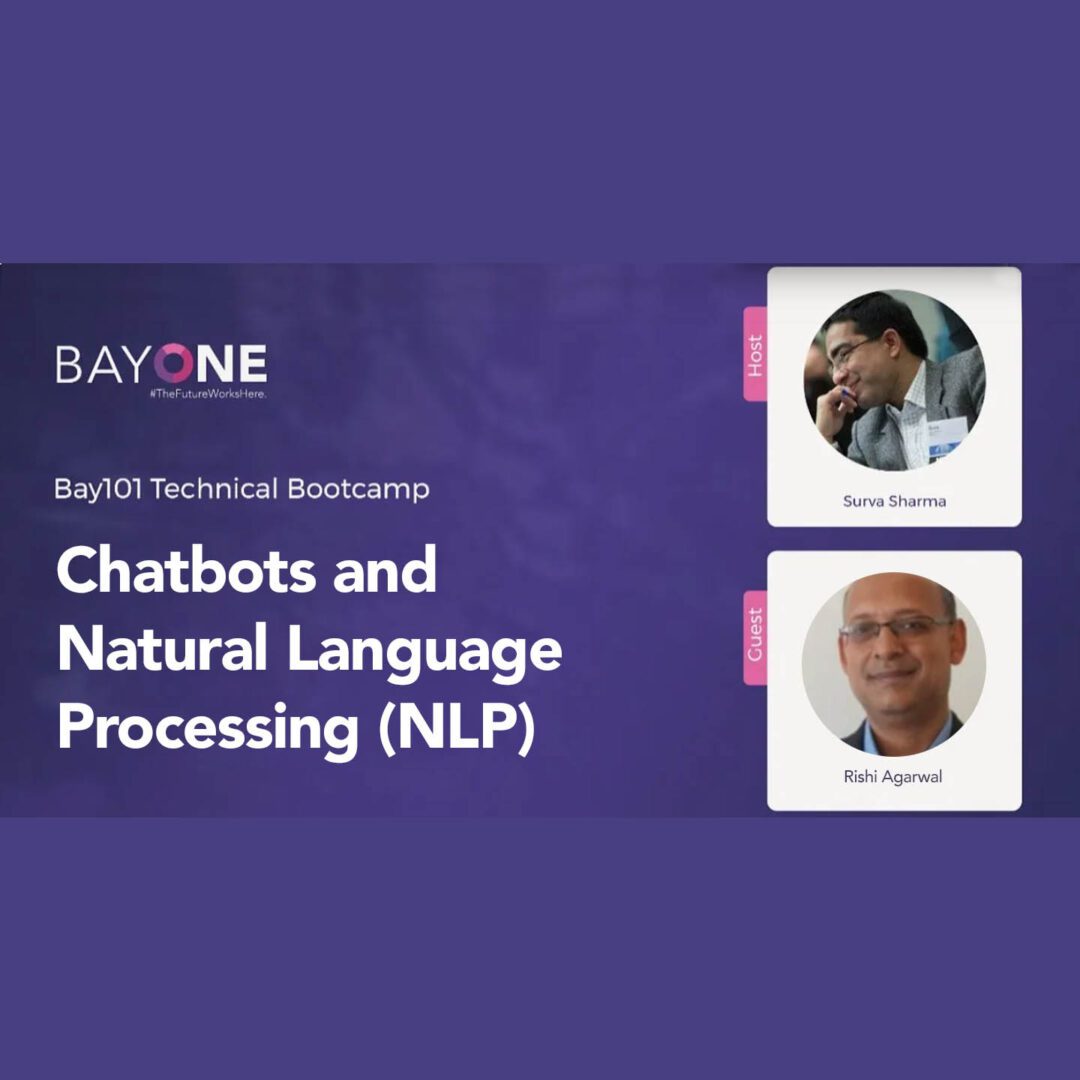In this Future of Work webinar hosted by BayOne Solutions, we dive deep into the evolving world of Product Management—a field now central to business success across industries.
Join leading product experts from PayPal, SurveyMonkey, Vitamin World, and Arkose Labs as they share their diverse career journeys, practical advice, and insights on:
• How product management has evolved
• Key skills that PMs need in today’s digital-first world
• Specialized PM roles (Growth, ML, Platform)
• How to break into product management (with or without a tech background)
• The importance of storytelling, data, and empathy in product leadership
Whether you’re an aspiring PM or a seasoned leader, this session offers strategic insights, resources, and career guidance to thrive in the future of work.
👉 Learn more about BayOne at bayone.com
📣 Follow us on LinkedIn for future webinars & expert panels
The Future of Product Management
[Music]
0:32 hey guys happy tuesday uh hello and welcome
0:37 everyone i’m glad that you were able to make take some time out to attend this live event i would like
0:42 to welcome all of our new attendees from around the world and welcome back all of our previous listeners as well
0:48 time to grab your lunch coffee or popcorn and let’s get this going
Introduction
0:53 my name is annette segal and i’m the vp of sales for strategic accounts at bay one solutions
0:59 a lot of you already know me and for for those who don’t a quick introduction about me i’m a
1:05 goofy fun guy that loves to talk about technology sports stocks space crypto and that means
1:12 entertainment is guaranteed dodge coin to the moon that was a joke
1:18 uh so jokes aside a big thank you to bay one for hosting this special event bay one helps large companies compete
1:25 like a startup since inception bay one has been helping companies with their transformation journey
1:31 whether moving to the future of work by providing qualified experts on demand training their legacy workforce on
1:37 future technologies or automating their business processes bay one has been doing it all
1:43 bay one has been focusing a lot on our community and giving back ever since the pandemic has started we
1:50 have been hosting these insightful webinars for over a year now and happy to welcome you back
1:56 um you know so this is a pretty interesting uh year in that sense there’s just so
2:02 much happening so what we’re really doing is we’re hosting a series of future of work events
2:07 because the technology landscape is changing fairly quickly and the job responsibilities and
2:12 organizations are changing even faster the first of these events being future
2:17 product management i also wanted to give a big shout out to our valuable customers employees and
2:24 consultants that are making a difference and also a hello to all of our future customers listening in
2:31 so why do this uh you know what’s really happening why product management we’ve received a ton of feedback and
2:38 questions on product management keeping that in mind we wanted to invite an elite panel
2:43 to talk about how to get into product and the evolution of product management itself
2:48 and how you can get involved with the same and maybe answer some of your questions along the way
2:54 so without further delay let me introduce you to my close friends and the panel for today
Panel Introductions (continued)
2:59 starting with the ladies — Nidhi Vadmark, she’s a Principal Product Manager at PayPal.
3:05 She has extensive experience in payments, healthcare, financial services,
3:11 e-commerce, capital markets, and management consulting.
3:13 She also leads a chapter for Women in Product, serving as a mentor to aspiring and early product managers.
3:22 Megha Rastogi is a Cornell, Harvard, and MIT graduate.
3:25 She has more than a decade of experience building innovative products at leading global companies
3:29 like Expedia, Yahoo, and Verizon. Currently, she is a Lead Product Manager at SurveyMonkey,
3:36 managing machine-learning powered insights and unifying identity and access management across SurveyMonkey products.
3:42 Travis Killian was — most importantly — the VP of E-commerce and Loyalty at Vitamin World,
3:49 with over 25 years working with internet technologies.
3:52 Travis has held roles in business management, product management, and technology management.
3:56 From startups to large companies, he’s created digital products and services
4:01 across many domains including real estate, retail, e-commerce, and loyalty.
4:06 And last but not least — Ashish Jain, who is a product visionary and strategist
4:10 in mobility, identity, and security product development.
4:13 He is currently the Chief Product Officer at Arkose Labs,
4:16 where he is responsible for managing global product and engineering teams.
4:19 Previously, he was the Head of Identity at eBay as well.
4:23 I hope you’re all as excited as I am to get this going.
4:26 So with that, let me hand this off to Ashish for the keynote — and let’s get the party started.
4:50
Ashish: Honest, thank you for the introduction and thank you to BayOne for giving the opportunity to share some of my thoughts.
4:56 Happy to be part of this panel. Before we get into the panel discussion,
5:01 I wanted to take a few minutes just to kind of share my thoughts on how product management has evolved,
5:08 what are some of the key skillsets that I see are needed today,
5:11 and hopefully that will lead into a good engaging discussion in the second part of this session.
5:20 If you can share the slide — on the first one —
5:26 I wanted to start a little bit on a lighter note.
5:32 Product management is an art, and it depends so much on the context.
5:36 And the context can be: what vertical or what industry you are part of,
5:38 what stage the company is at, who are your competitors,
5:42 and what stage of your career you are currently tracking towards.
5:46 But it’s about finding the right balance —
5:53 the balance between richness of features and simplicity,
6:00 the balance between security and the end-user experience,
6:05 the balance between time-to-market and quality of product.
6:11 And because it is so context-dependent,
6:17 you will not find too many courses or classroom settings where you can truly master product management.
6:22 A lot of it is learned on the job, through your day-to-day experiences.
6:29 And that makes it complex to become an expert —
6:32 but it also makes it exciting and fun to be part of this trade.
Product Management is a Function
6:36
Ashish: Coming to the next slide — and I’m sure you’ve seen some version of this —
6:42 product management is like the connective tissue across different parts of the organization:
6:47 Customer, Technology, and Business.
6:51 And when I say business, I mean a combination of sales, marketing, leadership, partners, analysts — everybody.
7:01 On a good day, you can say a product manager is like the CEO of the product.
7:07 On a not-so-good day, you feel like the janitor —
7:11 cleaning up all the pieces, catching the things that fall through the cracks.
7:14 But the key point is: product management is the glue.
7:21 It connects product design, development, go-to-market — everything.
7:27 And because of that, it’s critical to figure out the key skillsets needed for success.
Key Skills for Product Managers
8:03
Ashish: Many times the specific skills depend on your situation:
8:08 whether you’re working in a specialized domain, whether you’re an IC or leadership,
8:14 whether you’re working in a “red ocean” vs. “blue ocean” market…
8:20 But I wanted to focus on skills that are always relevant, no matter the context.
8:26 First one: Curiosity.
8:34 We live in an evolving, dynamic world.
8:40 The iPhone didn’t exist 15 years ago.
8:47 Today, there are over two million apps in the App Store.
8:52 Blackberry used to rule the world — today, nobody uses it.
8:59 CDs and cassettes — gone.
9:06 Tesla started just a decade ago — today, its market cap is larger than the next nine auto manufacturers combined.
9:17 So tech is ruthless. It’s disruptive. It changes fast.
9:30 As a PM, you must embrace change.
9:35 Always be learning, or you will fall behind.
10:06 Second one: Customer Empathy.
10:12 We all have biases — whether we realize it or not.
10:18 As PMs, you must force yourself to step into the customer’s shoes.
10:25 Have strong opinions — but hold them lightly.
10:30 Listen to feedback. Make listening a habit.
10:58 Third one: Communication.
11:05 Critical. Both verbal and written.
11:24 Engineers aren’t always known for communication — and a lot of PMs start from engineering backgrounds.
11:30 If you can’t communicate your ideas, you can’t lead.
11:48 Habit: Take notes. Start writing daily. Communicate clearly.
13:01 Fourth: Analytics.
13:08 Ten years ago, maybe you could survive without it.
13:14 Not today.
13:20 Being data-driven helps you uncover blind spots.
13:52 Fifth: Synthesis.
13:58 Take inputs from customers, partners, developers, sales, marketing —
14:15 synthesize all that information, and build a coherent product strategy.
14:34
Ashish:
If I can summarize:
14:40 Product management is about understanding your domain and your industry.
14:46 It’s about learning from your customers.
14:52 Analyzing data.
14:58 Synthesizing all inputs.
15:05 Communicating clearly — both internally and externally.
Recommended Books for Product Managers
15:11
Ashish:
Now, I also wanted to share some recommendations — things that helped me along my journey.
15:17 There’s no shortage of books out there: self-help, motivation, business.
15:23 But I handpicked these because they cover the spectrum of what you need when building products:
Inspired and Hooked:
15:28 — Essential reads to understand building great products and habit-forming products.
Measure What Matters:
15:48 — Teaches how to set the right metrics and avoid driving wrong behaviors.
Dare to Lead:
16:01 — For leadership skills. Negotiation, team building, change management.
Zero to One:
16:19 — A startup mindset. It’s not about copying Facebook — it’s about original thinking.
Building a StoryBrand:
16:30 — Helps you become a better storyteller — crucial for engaging customers and stakeholders.
16:56 This set covers building, measuring, leading, innovating, and storytelling.
17:02 And there are others: I love Adam Grant, Tom Rath, Daniel Pink. Amazing authors you should follow.
Podcasts for Product Managers
17:24
Ashish:
In addition to books, I wanted to share some podcast recommendations too:
17:29
Podcasts are great if you’re driving, walking, or working out.
Many feature interviews with product leaders — where you hear the “grit,” the “luck,” the behind-the-scenes.
17:50
The podcasts I’ve picked are ones where I personally got real insights — not just theoretical stuff.
18:08
Also, if you want to pick up foundational skills and processes,
18:14 — I’ve listed a few good online learning resources (hoping we’ll share the slides with you afterwards).
18:28
This is my thought process: building a habit of learning — reading, listening, practicing.
18:35
Again, really happy and excited to be here and looking forward to the second half of the session as part of the panel.
18:42
Anuj, back to you!
Quick Quiz
18:50
Anuj:
Alright — no session is complete without a quick quiz.
18:57
So here’s the quiz:
What is a product manager’s favorite wine?
19:02
(Hint: It’s not an actual wine…)
19:07
It’s the “low hanging fruit”!
(Laughter)
Getting into Product Management
19:13
Anuj:
Thank you, Ashish, that was awesome. I definitely feel like opening a bottle of wine after that.
19:19
Thank you for sharing all of those resources — super helpful.
19:29
Let’s move on to the panel now.
Hey Travis, hey Megha, hey Nidhi!
19:38
(Everyone greets back: “Hey!” “Hello!”)
19:43
Anuj:
What a great way to set the stage — thanks so much!
Let’s keep the momentum going by jumping into some deeper topics.
19:49
First topic: Getting into Product Management.
Everyone has a different story, a different journey.
19:54
For example, I (Anuj) ran a design firm before jumping into tech about 10 years ago.
20:01
Given my “figuring it out” mindset, I transitioned naturally to Product Management.
20:06
Anuj:
Alright, Nidhi — why don’t you tell us and the listeners about your journey into product management?
Nidhi:
20:26
Thanks, Travis. (small chuckle)
You know, my educational background is actually Economics, Accounting, and Finance.
20:34
I do not come from an engineering background.
20:40
In fact, my first paying job in the US was as a flight attendant for American Airlines —
which, again, is very unconventional!
20:47
At the time, I was working at a startup Monday to Friday,
and flying for the airline on weekends.
20:52
Soon after, I moved to the Federal Reserve Bank.
Then I went into management consulting.
20:58
At one point, I wanted to get into capital markets —
and that led me to a role at the Federal Home Loan Bank.
21:04
After that, healthcare, e-commerce…
and now, more recently, payments at PayPal.
21:10
The reason I give you that trajectory is because —
there’s this myth that you have to come from an engineering background.
21:16
There’s this belief that there’s only one linear path.
21:21
But my story is the complete opposite.
It’s more like rock climbing than a straight ladder!
21:28
I was always drawn to opportunities focused on:
Understanding customer needs
Anticipating future needs
Building relationships
Leveraging technology to solve real problems
Rallying teams around a shared vision
21:46
And the official “Product Manager” title came much later —
but the work I was doing, even at the Federal Reserve or in Capital Markets,
was fundamentally product management.
22:00
So that’s my story!
You can come from non-tech backgrounds and still be a great PM.
Anuj:
Thanks, Nidhi — love that!
22:06
Megha — over to you. Tell us your journey.
Megha:
22:29
Sure, thanks Travis. (smiles)
Mine is a little bit more traditional.
22:35
I come from an engineering background.
22:41
I started out working in the telecom industry —
building features, pieces of larger products.
22:46
But I always found myself questioning:
“How does this feature fit into the larger product vision?”
“How does it add value to the customer?”
22:53
I wanted to see the whole picture.
I wanted to work directly with customers.
I wanted to solve real pain points.
22:59
That’s what drew me into product management.
23:04
Since then, I moved from telecom to product strategy at Yahoo (focusing on emerging markets).
Then I moved to the travel industry with a global PM role at Expedia.
Now I’m at SurveyMonkey, leading the machine learning platform.
23:16
And like Nidhi said — regardless of where you start —
the common thread is keeping the customer at the center.
23:22
It’s all about solving for the customer.
23:29
Happy to be here today!
Anuj:
Thanks, Megha! Fascinating to hear your path.
23:35
Ashish, same question — tell us your journey.
Ashish:
23:41
First, it’s really interesting to hear the three of you share such different routes!
And honestly, that’s very reflective of Product Management today.
23:47
My story is more traditional too:
Started with an engineering background.
Spent the first 10 years as an engineer.
24:11
Then, at some point, you hit a fork:
Do you want to continue and become an architect?
Or do you want to become more customer-facing?
24:17
I ended up shifting almost by accident.
I was at a startup — and in startups, you do everything.
24:22
Doesn’t matter your title — you end up working across disciplines.
And I fell in love with working closer to customers.
24:27
Since then, I’ve spent the last 15 years in product roles, and I’m still loving it.
Anuj:
Thank you, Ashish!
24:39
(Addresses the audience)
As you can tell from these stories —
product managers evolve throughout their careers.
And product management itself is evolving too.
Evolution of Product Management
24:45
Anuj:
In a similar way to individual careers,
the role of product management has evolved.
24:51
Earliest roots started in 1931 at Procter & Gamble.
24:56
Then Hewlett-Packard in 1943 really boosted it.
25:02
Later, the Agile Manifesto in 2000 and the rise of Scrum and Lean methodologies pushed it forward again.
Anuj:
25:08
It’s worth calling out — and Ashish touched on this earlier —
the product manager’s role can vary.
25:14
Some act like the mini CEO of their product, with full P&L responsibility.
Others have less liberty, but still carry huge responsibility to help shape strategy and define the product.
25:20
Yet others are more in the “janitor” model —
someone else figures out the business and strategy, and the product manager focuses on definition and execution.
25:26
But regardless of company —
the essence of the role is to create a bridge.
25:31
Remember Ashish’s diagram? It’s about creating a bridge between the business, the customer, and technology.
25:37
So product managers must change with the times.
Remote & Hybrid Work
Anuj:
25:50
For example, COVID has changed the way we work.
Besides the new fashion trend of dress shirts and sweatpants (laughs),
or the beloved face mask replacing our ties —
26:03
Remote work has made a quantum leap.
26:11
Ashish — I’d like you to speak to our listeners about your view on the mix between remote work, on-site, and hybrid.
Ashish:
26:18
Fair enough.
The concept of distributed and global teams is not new, especially if you’re in the Valley.
Most companies, once they hit a certain scale, end up having offices across the country, or even internationally.
26:25
But COVID just took all that to a completely different level.
26:31
Those in-person customer meetings, or those ad-hoc whiteboarding sessions with your architect —
they completely disappeared.
26:37
It’s still TBD in my mind how all of this will evolve once COVID is fully over —
but I would be surprised if we go back to the exact state we were in a year ago.
26:54
I think this remote, distributed, Zoom-driven collaboration —
it’s going to stay.
27:05
In my mind, we’ve adapted well.
But I still think there’s richness you can get from in-person whiteboarding discussions
that’s hard to replicate virtually.
27:16
So the world we live in — and the world we will continue to live in —
will be hybrid.
And communication will become an even bigger skill set for product managers.
27:30
Personally, I don’t think you can fully replace meeting someone in person —
especially for forward-looking strategic conversations.
But on the operational side,
I think we’ve adapted quite well to remote.
Anuj:
27:55
Great, thank you.
Megha — let’s come to you now.
Another part of the evolution of product management is the rise of specialized roles —
like machine learning, growth, and platform PMs.
28:02
Can you walk us through that?
Megha:
28:08
Sure.
So, as you said earlier —
traditionally, product management came out of the marketing org.
It was a general PM role, focused on solving customer problems.
28:19
But now, as companies scale —
and as we shift more toward remote —
we’re seeing a lot of specialization based on the growth stage of the company.
28:30
So you’ll see new roles emerge:
Platform PMs, focused on scale and ensuring that internal platforms can grow with customer needs.
Growth PMs, who are more tactical, focused on acquisition and retention.
Machine Learning PMs — that’s where I sit.
28:53
With ML PMs, we’re still solving customer problems —
but there’s a new variable: data.
29:00
Now, we need to ask:
Do we have the right data?
Can we build accurate algorithms?
Are we being mindful of ethical AI?
29:13
So the role is changing —
and will continue to evolve based on company stage and industry.
Anuj:
29:19
That’s a great point.
And interesting how product management used to be kind of rules-based —
a checklist of “build these things.”
29:26
But now, with ML and growth loops, it’s sometimes about training the product, not just defining it.
29:31
Let me double-click on something there:
Who’s leading growth in today’s companies?
Is it sales, is it marketing, or is it product?
What’s your take?
Megha:
29:44
Yeah, so in the past, it used to be:
You build a product, then you hand it off to sales — they go sell it.
Or you hand it to marketing — they put a campaign or spin on it.
30:05
But now, more and more, we’re seeing a shift toward product-led growth.
30:10
Which means — the product itself is responsible for:
Acquiring users
Retaining users
And selling itself.
30:16
So the focus is on building an intelligent, sticky product
— something that delivers so much value, it sells itself.
30:22
That’s why we see machine learning coming into the picture —
because it can personalize, optimize, and help users get value faster.
30:27
And beyond that, there are also hooks — things that get users to come back,
like notifications, habit loops, or network effects.
30:32
So yeah, we’re in a product-led world now.
Anuj:
30:40
Thank you, Megha — I love that framing.
If you’ve ever been to a national marketing trade show,
you’ll notice they look more and more like tech conferences now.
That just shows you how the worlds are blending.
Anuj (to Nidhi):
30:52
Nidhi — I said earlier that product management is about bridging the gap between
business, customers, and technology.
I think this is why the role is growing so fast.
31:03
Can you share your view on why PM is seeing so much growth?
Nidhi:
31:09
Yeah, sure.
Ever since I added PayPal to my LinkedIn,
I’ve been flooded with requests from students and aspiring PMs.
31:17
Everyone wants to get into product management these days.
And I think that’s because the demand and the visibility of the role has risen significantly.
31:27
Let me zoom out a bit.
If you look back at history —
the First Industrial Revolution started in 1760.
Its major invention? The steam engine.
31:40
A century later, the Second Revolution gave us mass production,
steel, oil, electricity.
32:00
Then came the Third Revolution — the digital revolution in the 1960s.
And now we’re in the Fourth Industrial Revolution.
32:07
But this one’s different for two reasons:
The gap between digital, physical, and biological is shrinking.
Technology is changing faster than ever.
32:20
Tech is evolving so quickly —
we’re seeing AI, IoT, blockchain, and more.
32:34
And so companies must adapt —
they must deliver amazing digital experiences,
or they’ll lose customers — because your competitor is one click away.
32:59
If you snooze on quality,
you lose.
33:04
So PMs are now mission-critical to help build
seamless, customer-centric digital experiences.
33:12
That’s easier said than done.
Being truly customer-obsessed is really hard.
Creating seamless online + offline experiences is very hard.
33:18
And that’s where PMs come in.
Nidhi:
33:25
Product management is a fluid role.
It’s connective, demanding, and varies by situation and company.
33:37
But the traits that make a great PM?
They’re universal.
Here’s what I believe are non-negotiable:
Insatiable curiosity
Strategic thinking
Clear communication
Effective collaboration
Technical acumen
User empathy
Detail orientation
And strong leadership
34:13
That’s the core of it.
This role is about delivering value —
not just shipping features.
34:19
The best PMs? They’ll do whatever it takes to deliver:
Customer value
Team alignment
And business outcomes
34:32
And it doesn’t matter which industry you’re in —
whether it’s capital markets, healthcare, e-commerce, or payments…
34:39
Every person in a company — as Fred Kofman once said —
has just one role:
To help the company win.
34:46
Your title doesn’t matter. Your function doesn’t matter.
Product management requires a unique blend of skills —
and it’s because of that, we’ll see the need for great PMs continue to grow.
Anuj:
35:03
Thank you, Nidhi — that was a lot of great food for thought.
I’ll add one quick thing.
35:16
This is truly the age of the customer.
They have tools, choices, and expectations like never before.
If your product doesn’t delight them, they’ll leave.
35:35
So as Nidhi said — the bar is higher.
Companies have to keep investing in product.
Because the competition is just one click away.
Anuj (to Ashish):
35:47
Ashish, you mentioned earlier the importance of skills like curiosity.
Do you think those skills are evolving with the times?
Or are they more timeless?
Ashish:
36:05
Yeah, so I think — and Nidhi touched on this a little — but as our industry matures, so do the roles.
You see this in any ecosystem. As things mature, you go from generalists to specialists.
36:16
Think about it biologically.
The first cells had to do everything —
but over time, we evolved into complex organisms,
with a heart, a liver, a brain — all specialized.
36:30
Product management has followed a similar path.
Ten years ago, PM work was often shared by marketing, engineering, maybe sales.
Then came the realization: this needs to be a dedicated function.
36:48
Now — we’re seeing even more specialization:
You have growth PMs, ML PMs, platform PMs, security PMs…
37:00
It’s fascinating to watch. And it’s only going to deepen.
But even with specialization — the core skills stay the same.
37:17
You still need:
Communication
Curiosity
Customer empathy
These will always matter — whether you’re leading growth for DoorDash or working on enterprise infrastructure security.
37:41
Early in your career, you can explore and jump between domains.
Later, it gets harder. You build deeper expertise —
but it also narrows your options for switching.
38:05
So, it’s important early on to figure out:
What excites you? What are your natural strengths?
That’ll shape your path.
Nidhi:
39:01
Yeah, that’s such a good question.
As product managers grow more senior, you shift from managing products… to managing strategy and people.
39:08
And I forget who said this — so I won’t attribute the wrong name —
but I once heard:
“The people who run a shipyard don’t build the ships themselves. They hire the best shipbuilders, create the right environment, and provide the tools and support needed to build great ships.”
39:25
That’s what leadership in product is.
You stop building the ship yourself —
you build the shipyard.
39:32
So, when you move from IC to management, you have to let go of “doing everything.”
Now your role is to enable, coach, mentor, and provide clarity.
39:50
You focus more on:
Managing up and across
Driving business outcomes
Owning the product vision
Rallying teams around a common goal
40:09
And that’s not always easy.
Especially if you know how to do something well — it’s hard to step back and delegate.
But great product leaders build people, build products, and build companies.
40:48
You start working not just on products — but on culture, processes, and energy.
You’re the force that turns a product aspiration into valuable outcomes.
Megha:
42:55
Sure!
So like we’ve talked about — product management is a broad role.
There are some key skill sets…
But you don’t have to come from one specific background.
43:00
You can come from any industry.
The key is:
Can you solve a problem from a customer or business perspective?
43:12
Can you break that problem down, prioritize the right pieces,
and work across stakeholders to deliver a solution?
If yes — you’re already doing the core of what product managers do.
43:24
And if you can clearly communicate that vision,
and rally others around it — that’s your sweet spot.
43:30
Today, it’s not hard to get into product management,
but it takes intentional effort.
43:35
There are also certifications and schools out there —
like Product School (which I also teach at!) —
that focus on the fundamentals of PM.
43:50
So whether you’re learning through teaching,
hands-on work,
or applying past experience —
there’s no one right way.
You have to own your journey.
Travis:
You touched on something I want to double-click.
There’s education, certifications, job experience…
But in the end, is it just about skill-building and tenacity?
Or do you recommend a more structured path?
Megha:
44:02
It’s really about understanding:
Where do you want to go?
What are your strengths?
What is the company looking for?
44:26
If you come from a technical background — and the company needs a technical PM — that could be a great fit.
44:31
But I’ve also seen amazing PMs come from customer success —
They understand users deeply, day in and day out.
44:42
Same with data analysts —
They bring a unique lens that’s great for growth PM roles.
45:02
So the path is not fixed.
It’s about finding your superpower,
understanding the company’s need,
and making the match work.
Travis:
45:10
Exactly. It’s that self-awareness — “know thyself.”
What are you good at? What’s your natural strength?
45:16
And to add to Ashish’s great book list —
one book I’d highly recommend is:
“First, Break All the Rules”.
45:22
It’s more leadership-focused — but it’s about hiring and growing people based on their innate talents,
the neural pathways they already use.
45:28
Because when someone is talented in something,
they process information and decisions so much faster and more effectively.
45:34
Like — I’m not the person you want singing at karaoke.
I’ll clear the room out!
But product management —
figuring things out, connecting dots — that’s my jam.
45:44
So if you’re a developer who loves solving problems with known variables,
you might enjoy building.
But if you’re someone who thrives in ambiguity,
connecting unknown variables,
and creating clarity for others to build on —
that’s where product management shines.
46:01
It’s not about having all the answers —
It’s about asking the right questions,
then building the right environment for others to succeed.
Travis:
Well, this has been a great conversation.
Before we wrap up, let’s go off the rails a bit —
do some live Q&A.
Let’s take some questions from the audience.
Audience Question:
What’s more important for a PM: domain expertise or technical expertise?
Nidhi:
46:32
I’ll take that one first.
It comes down to:
→ What drives you?
If you’re in a domain you don’t care about, you’ll lose steam.
46:45
For example — years ago, I was working in e-commerce on health & wellness.
Then I was offered to work on online alcohol sales.
47:02
Now, I enjoy a good glass of wine…
but I knew I wasn’t the right PM for that product.
I didn’t believe in it.
47:14
So for anyone early in their career —
Pay attention to what you consume: the content, the books, the topics.
That’s a clue to what interests you.
47:32
And if you do that, you’ll start identifying your ideal domain.
Ashish:
47:38
Yeah, just to build on that —
I think there are two parts here.
47:41
First, know your strengths.
There’s a great book by Tom Rath called StrengthsFinder — I highly recommend it.
47:47
Don’t just get into product management because you think it’s glamorous.
Ask yourself:
→ Will I actually enjoy this for the long haul?
47:54
Second, I think about a product career in three stages:
48:00
Early career — I look for aptitude, curiosity, a desire to learn.
That’s where it starts.
48:05
2. Mid-career — now you’ve proven you can collaborate, ship something.
This is when I start looking for domain expertise.
It matters more now.
48:18
3. Late-stage — this is where I’m looking at your ability to lead,
not just build product, but build people and drive strategy.
48:25
So in short — both tech and domain matter.
But when they matter depends on where you are in your journey.
Travis:
48:32
And to that point —
The biggest place I see PMs fail isn’t domain or tech…
48:36
It’s communication.
48:39
PMs lead by influence.
If you can’t tell a story —
→ Why we’re building this
→ Who we’re building it for
→ How we’ll measure success
→ How to prioritize it…
48:48
If you can’t clearly articulate that vision…
you won’t be effective.
48:52
You could be the smartest engineer or analyst,
but without storytelling and influence,
you won’t break through.
Audience Question:
“What’s the difference between a Project Manager and a Product Manager?”
Megha:
49:00
This one comes up a lot —
“PM vs. PM” confusion! Also, add “Product Owner” to the mix.
49:07
So here’s how I see it:
→ A Project Manager is focused on execution.
Milestones. Timelines. Coordination.
→ A Product Manager is focused on outcomes.
Customer value. Strategy. Impact.
49:22
In practice:
→ A project manager makes sure we ship “on time.”
→ A product manager makes sure we ship the right thing.
49:30
But yes — depending on the company, these roles can overlap.
Ashish:
49:36
Yeah, to build on that —
Project managers keep the trains running.
Product managers decide where the train is headed.
49:45
And in a startup, honestly — you’re probably doing both.
Travis:
49:50
Also — “Product Owner” in agile teams…
Some companies make that a junior PM.
49:55
In bigger orgs, you may have a Product Manager who sets the strategy,
and a Product Owner who manages the backlog and day-to-day.
Nidhi:
50:02
Yes, and every time I hear “Project Manager” I flinch a little!
They’re very different disciplines.
50:08
Product Managers focus on:
→ Customer insights
→ Strategy
→ Execution
→ Influence
50:15
Those are the core competencies — regardless of your level.
And I’m not a huge fan of separating “Product Owner” from “Product Manager” —
I think it’s the same discipline at different levels of seniority.
Audience Question:
“Should I take a product management job at a startup or an established company?”
Ashish:
55:49
That’s a great question — and the answer is, it depends.
55:54
I’ve worked at big orgs like VMware and eBay, and I’m now at my second startup.
56:00
In large companies, you get structure, well-defined roles, and strong go-to-market functions.
But things can be slower. There are more people, more coordination.
56:09
In startups, you have fewer people — so you do a little bit of everything.
You’ll feel like the janitor sometimes — picking up pieces others don’t.
56:15
But you learn fast. You wear multiple hats. You build grit.
56:19
If you can, I highly recommend trying both at some point.
They build different skill sets. Both will make you a better, more well-rounded PM.
Travis:
56:26
Yeah — and if you’re already in a company and want to move into PM,
start where you are.
56:31
Use your network, use your internal reputation —
That internal grace gives you room to learn.
56:36
And if that’s not possible — reach out to Ashish, he’s hiring!
Anuj (Moderator):
56:42
Haha, love it. OK, folks — we’ve reached the end of our Future of Product Management session.
56:47
Huge thanks to our incredible panel —
Nidhi, Megha, Ashish, and Travis — thank you all for your time and insights.
56:54
And to our audience — if you didn’t get to ask your question live,
Tweet us at @BayOneSolutions and tag it with #FutureOfWork.
57:01
This session will be available soon on YouTube —
So if you missed anything or want to share it, head over to our channel.
57:07
And if you’d like to learn more about BayOne, visit our website —
We have tons of content and upcoming events you can explore.
57:14
Thank you again — hope to see you in the next livestream.
Take care and talk to you soon!





